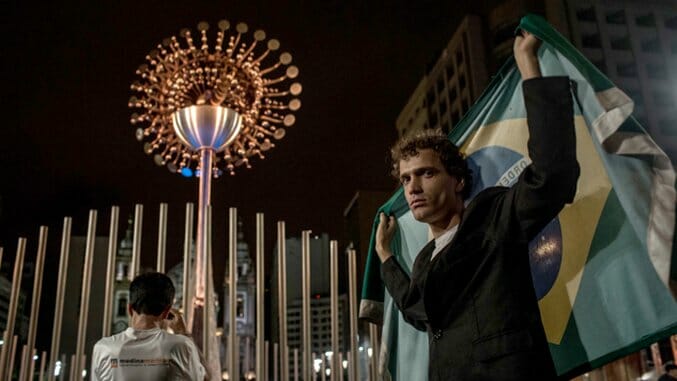Rio 2016 Was an Attempt To Prove a Dying System Still Works
Photo by Chris McGrath/Getty
Did you at any point stop to wonder why there was such commotion over the Rio Olympic diving pool suddenly turning green two weeks ago? Things, after all, go wrong at sporting events all the time. But though the explanation for the color change turned out to be predictably mundane, before any reasons were given people were fascinated, curiously obsessing over this relatively minor development. Though they couldn’t put their finger on the problem, Olympic fans were uncomfortable because they recognized something just wasn’t working the way it was supposed to. This glitch was a reminder amid the spectacle that it was all just an illusion.
Rio 2016 was an apparent display of unity in a world that’s increasingly divided. It was — following a well-publicized mass ejection of Russian athletes pushed out for doping — supposed to be a symbolic middle-finger to corruption, with events taking place in a country rife with it. But more than anything, Rio 2016 felt like a bid to prove the dominant neoliberal order is still in working condition, at a time when economists and other experts are saying that that system is on its last legs. The people of Brazil certainly feel that. The country is currently deep in a recession, its worst for a century, but you would barely know it from the $11-billion dollar flash of the 2016 summer games. As fireworks popped, Brazilians starved.
In February last year, the OECD published a report which found that the share of economic growth as enjoyed by workers in G20 countries (those include the US, the UK and Brazil) was at its lowest since WWII. Earlier this year, meanwhile, there came an even bigger bombshell: the International Monetary Fund (IMF) released an essay entitled Neoliberalism: Oversold?, which conceded that neoliberalism had in practice increased inequality and hampered economic growth. That the IMF, one of the most staunchly neoliberal of all contemporary institutions, was criticizing policies it had long endorsed was a hint to many that neoliberalism had perhaps had its day.
Still, we won’t be rid of this economic model just yet. George Monbiot recently referred to neoliberalism as a “zombie doctrine,” as while we have now reached a “low-growth, low-inflation, low-interest-rate equilibrium,” neoliberalism nonetheless “staggers on” because we’ve yet to find an alternative. For now, until someone comes up with something better, those running the show have to keep on pretending everything’s all right with the failing system we have.
-

-

-

-

-

-

-

-

-

-

-

-

-

-

-

-

-

-

-

-

-

-

-

-

-

-

-

-

-

-

-

-

-

-

-

-

-

-

-

-








































